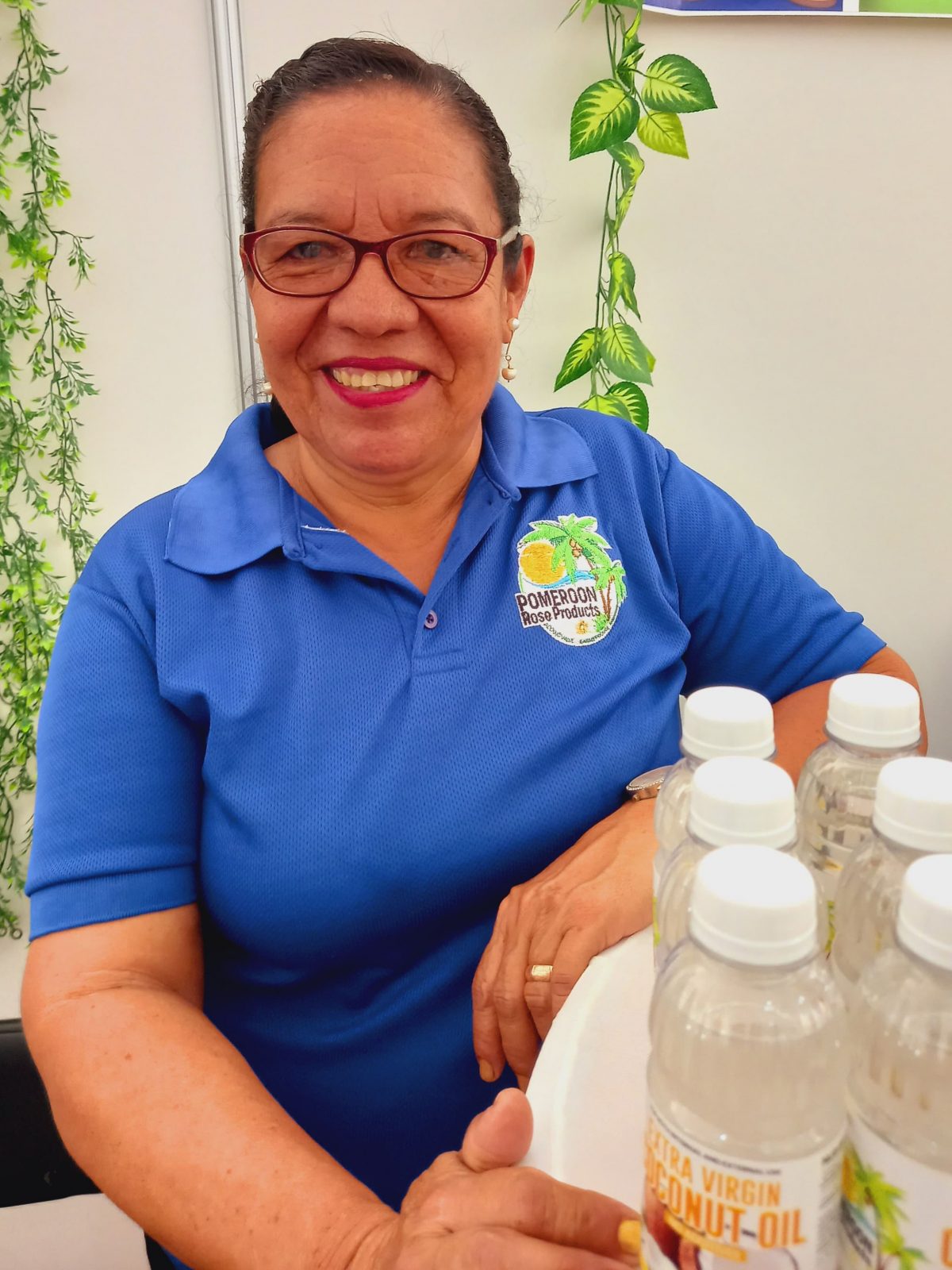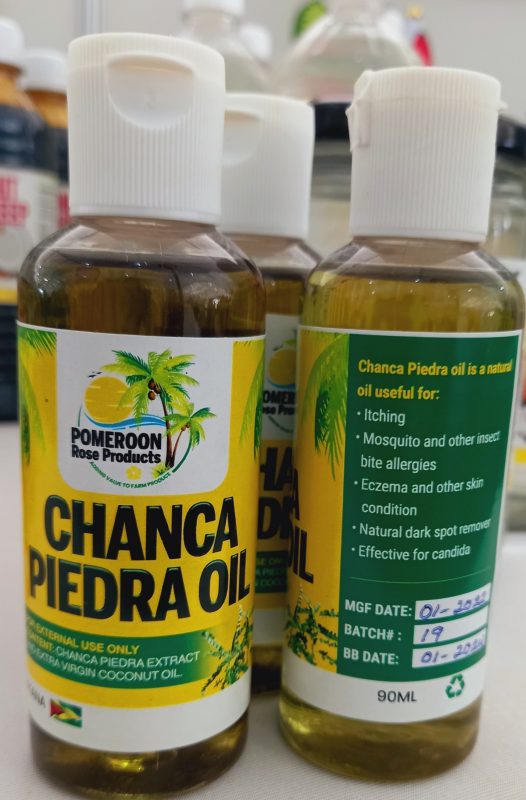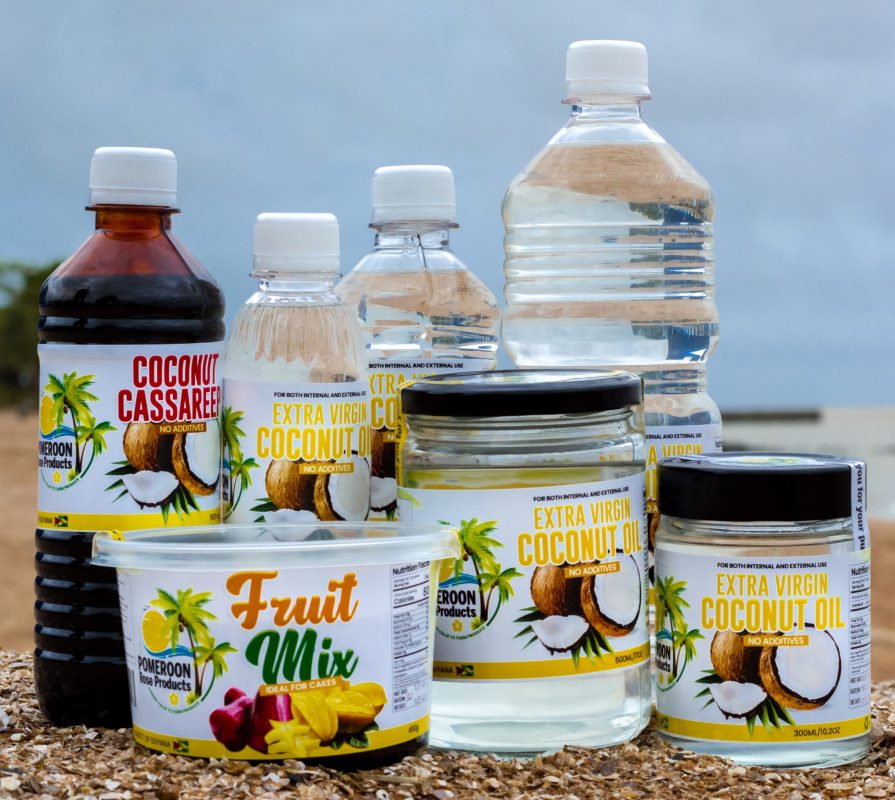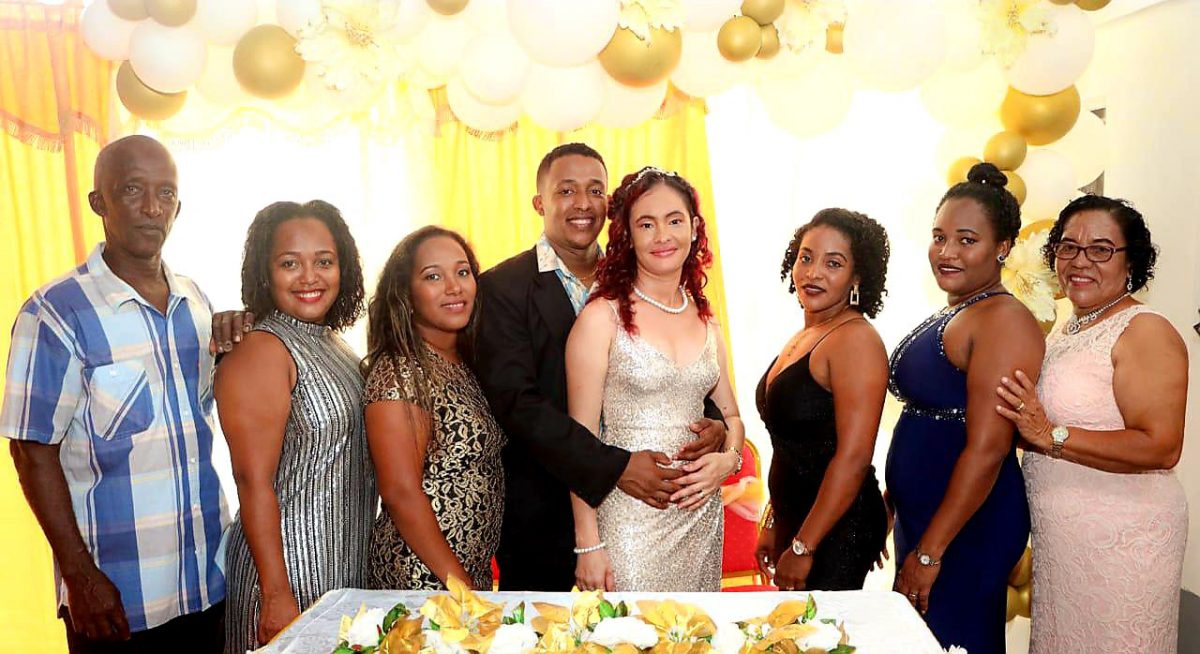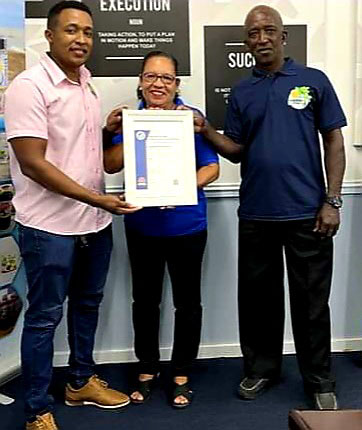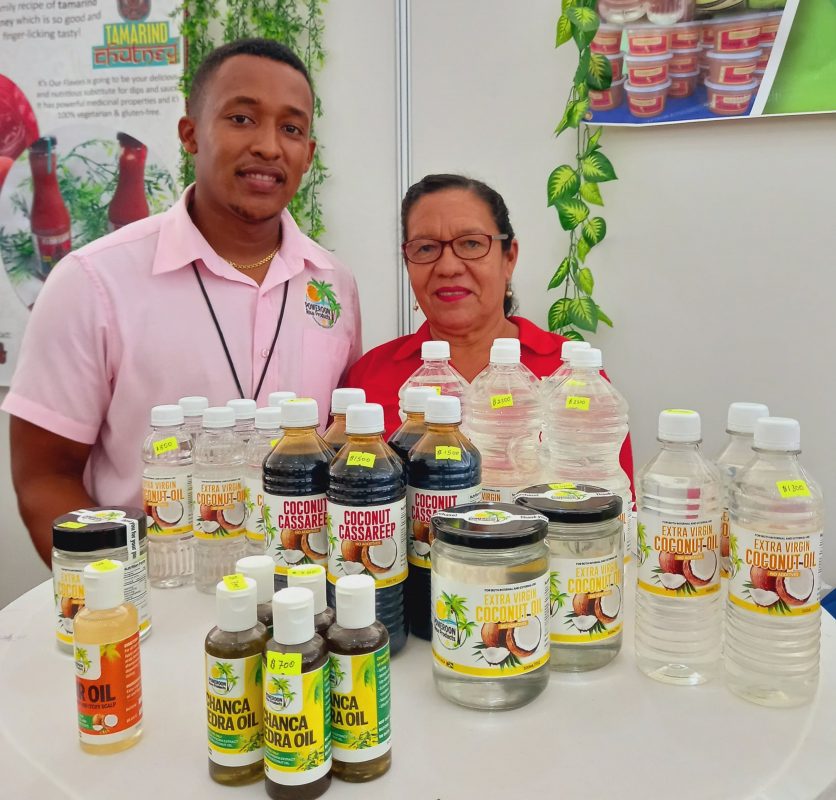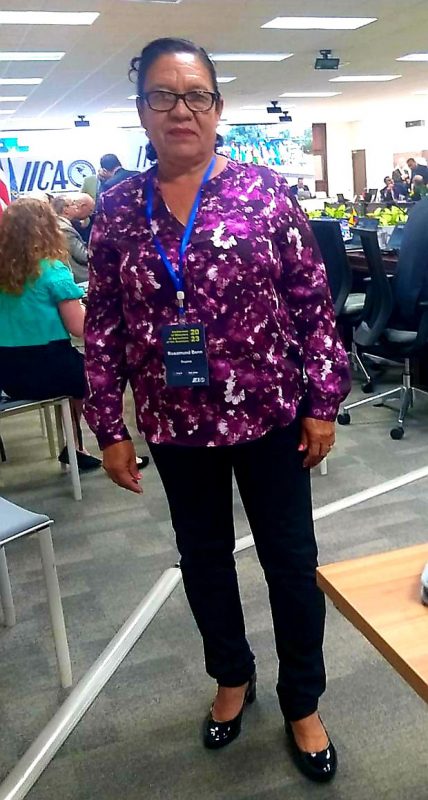Rosamund Benn nee Gouveia was just 16 years old when she got married and according to her did not know “how to cook or keep house or how to do farm work”, nor was she equipped with any skills to earn a living. However, she was a quick learner, and began to farm with her husband and to take their produce to market.
By virtue of hard work, taking every opportunity to learn about agricultural production and adding value to farm produce, Benn, now 58, is an agro-processor, trading under the name Pomeroon Rose Products, and inspiring other women by her example. She pioneered the marketing of virgin coconut oil in Region Two (Pomeroon/Supenaam).
“If you know to make green seasonings that is better than others you buy, don’t tell yourself you can’t market yours. Give it a try. I have encouraged lots of women, even some who work part time with me, to get on board. You have your own coconuts, make your own coconut oil and sell it. The money you get from that can give you a push. If you stop when challenged, that is when your plant will die. Continue watering it. It will grow and one day it will bear the fruits you were looking for,” Benn said.
For her years of toiling with her husband and for inspiring others, Benn, on Thursday last, received the ‘Soul of Rurality Award’ after being named a ‘Leader of Rurality of the Americas’ by the Inter-American Institute for Cooperation on Agriculture (IICA) at the Conference of Ministers of Agriculture of the Americas in San Jose, Costa Rica.
Benn of Grant Wide Garden, Lower Pomeroon River, was born in Waramuri Village, Moruca. “When I attended Waramuri Primary School, there were very few houses and lots of bushes on Waramuri Mission. We walked barefoot to school on the hot white sand there. The village was very poor and we were very poor,” she recalled.
She left Waramuri Primary at 15, after she wrote Parts I and II of the Secondary Schools Proficiency Examinations and obtained three Grade As and a B of which she was proud.
Benn, who is of Warrau and Lokono (Arawak) ancestry, was about six months old when her father left her mother to fend for herself and their two children. She subsequently met and married Benn’s stepfather, with whom she had eight more children.
“After living for about eight years on the mission we moved to Para over the swamp to be closer to the farm lands where life improved a bit. The challenge was getting to school during the rainy season. Sometimes we had no boat to get across the swamp to school… In the dry season we walked on round woods to get across,” she explained.
In those days, employment was non-existent in Waramuri. Only the village nurse and teachers had steady jobs. Both men and women left their homes to work as farm hands and labourers on the farming grants on the Pomeroon where they earned meagre wages. Some of the men left the village to work in the timber grants and gold fields further away.
“Life was very difficult for us. Money was hard to come by except for when my stepfather went out to work. I recall women weeding between the cassava trees but being paid with a quake of cassava root weighing between 50 to 70 pounds, for a day’s work,” she said.
During the early 80s, she said, “We couldn’t get many items. I remember my dad [stepfather] looking for a special tree for its roots. He’d scrape the roots and wash it in the water to create soap-like suds to wash our clothes. We fetched water for home use from ponds dug close to the home.”
Meeting Randolph
At school, Benn took part in athletics. Her husband-to-be, Randolph Benn of the Pomeroon River, five years her senior, had first seen her run in a race and began to pursue her but she resisted his advances. He wrote letters to her but she never responded.
“Whenever, I went to Charity with my parents to sell cassareep and coffee beans and he saw me he spoke with me. Overtime, I became attracted to him and I grew to love him,” she said.
When she left school in 1981, Benn accompanied her parents that August to work in the Pomeroon. One day Randolph, then 21 years old, stopped at their place of work to sell fish and he saw her again. “Two weeks later, he asked my parents to marry me. My mom said I was too young and I didn’t know to cook or how to keep a house,” she recalled.
Her future mother-in-law said she would teach her the things she needed to know and her mother told Randolph to wait until she was 16. Benn celebrated her 16th birthday on the 8th December, and was married on the 31st December. Now married for 42 years, they have four daughters, a son and 12 grandchildren.
Randolph’s parents were farmers and fisherfolk and he too fished and farmed. They lived with Randolph’s parents for six years during which time they started building their home.
Farming
When they married, Benn’s mother-in-law gave Randolph five acres of transported land. The newly-weds also acquired some 40 acres of leased lands from the government.
In the 1980s when they got their first parcel of land, they planted all types of vegetables as well as bananas, plantains, sweet potatoes, eddoes and coconuts, their main crop.
“When contraband was the going thing and people made their money from contraband, we made money from farming. That’s how we built our house,” she said..
Her mother-in-law taught her how to bake cassava bread and they baked to supply the Georgetown market.
“I baked about 150 cakes a day starting very early in the morning and finishing about 2 pm,” she recalled.
After her children completed secondary school and some did tertiary level education, the Benns started to look at adding value to their main product, the coconut. It was selling cheaply. “We started making coconut oil, the one you boil,” she recalled.
In 2005, Benn joined the Pomeroon Women Agro-Processors Association (PWAPA). She served as secretary for some years and then was its chairperson. As an executive of PWAPA, she attended seminars and conferences held locally and internationally on women in agriculture. “Most of the time I was selected to attend because I like to talk,” she said.
Through the PWAPA, she learned about IICA.
“IICA, the Guyana School of Agriculture (GSA), the CUSA International and the Ministry of Agriculture were our training partners,” she related. “I learned about business development, business management, financial management, product development, marketing, packaging and most of what we needed to know in managing a sustainable business. IICA and CUSO exposed us to what others were doing elsewhere and what we could do. I’m grateful for the training I’ve had over the years and the many forums by other organisations. My travels to many parts of the world were facilitated by the African Caribbean Pacific group of countries, the United Nations agencies, IICA and the previous and current governments.”
Wadnet
The Women in Agro-processors Development Network (Wadnet) comprising 12 women’s groups from Regions One, Two, Four, Six and Nine, was formed in Hosororo in August 2012 to meet the marketing and other needs of the women’s groups in those regions.
Wadnet has a paid administrator, and a volunteer facilitator in Dr Maxine Parris-Aaron of IICA.
From Region One, Blue Flame Women’s Group of Hosororo markets cocoa sticks, cassava bread, cassava cassareep, virgin coconut oil, ground coffee. Waini Secrets Women’s Group markets crabwood oil, crabwood oil cream, crabwood oil soap and crabwood oil lotion.
From Region Nine comes peanut butter, cashew nuts, peanuts, salted peanuts, cashew nut butter and farine. The group, Medicine From Trees, also markets some herbal tinctures including Kaiambe, which, Benn said, is good for fibroids and provides relief from cancers.
Region Six markets coconut biscuit, mittai, pepper sauce and green seasonings.
From Region Two comes cassava bread, carambola, cashew cake mixes, green seasonings, hot peppers, acai berry wine, acai berry powder, acai berry oil, virgin coconut oil and coconut cassareep.
Benn, who trades under the name Pomeroon Rose Products, also manufactures a herbal oil made from the chanca piedra bush. It is good for mosquito bites, sand flies and itches.
All of the Wadnet members’ factories are certified by the Food and Drug Analyst Department with annual renewable licences to operate from the Deeds Registry.
Last year, the Guyana National Bureau of Standards gave approval for Pomeroon Rose Products to market its virgin coconut oil and coconut cassareep under the ‘Made in Guyana’ brand.
Pomeroon Rose also produces fruit cake mixes, hot pepper sauce, and two different hair oils – one for growth and thickness and the other, for dandruff and itchy scalp.
Benn first started selling her products to the Guyana Shop operated by the New Guyana Marketing Corporation (GMC). “Thank God for GMC,” she said fervently. “They buy all our products. They encouraged us with labelling that includes bar code, batch number, manufacture date, expiry date etc. They said get your licences and we will buy from you. They have lived up to their word.”
Benn’s markets for various products include N&S Mattai, Massy supermarkets and Giftland Food Max.
Virgin coconut oil
In 2010, Benn started making virgin coconut oil on a large scale using only solar heat. During the 1980s she made the boiled coconut oil to sell when there was a shortage of imported vegetable cooking oils.
“We sold coconut oil to Suriname traders. Then we stopped making coconut oil when copra and the round nuts were selling good on the market. After the price for copra fell, I restarted making coconut oil,” she said.
In 2010, while a member of the PWAPA, Benn learned about virgin coconut oil, known also as ‘pressed oil.’
“I showed what I had made to our members. They said that was the oil they were looking for. That was the birth of my virgin coconut oil,” she said. “I learned to make it at home by myself through trial and error. I was very keen to make it because I had bought some virgin coconut oil prior to making my own but they were rancid. Sometimes I couldn’t even use them. My virgin coconut oil is natural, no chemicals. You can use it as a mouthwash, you can put it in your coffee, you can use it in your hair.”
She was still a member of PWAPA, when Region Two held a regional innovative project contest. The group won the award for the best innovative product with the virgin coconut oil in which Benn was a major player. “The money we won for that project was used to develop the group.”
In 2017, after leaving PWAPA, Benn registered Pomeroon Rose Products and subsequently joined Wadnet independent of PWAPA. The year she joined Wadnet under her brand, Benn was elected its president. The incumbent, she has completed serving two terms at different periods.
Family business
Benn’s son, Samuel, for the past two years, has been Pomeroon Rose Products’ marketing manager.
A graduate of the GSA where he studied forestry, he worked for a year with the Guyana Forestry Commission then obtained a bachelor’s degree in environmental studies from the University of Guyana (UG). After UG, he worked for five years with the Protected Areas Commission spending most of his time at Shell Beach managing the endangered marine turtles.
On joining Pomeroon Rose he revamped it while still doing environmental-based consultancy offshore.
“Sales were slow. Samuel redesigned the labels and started seeking markets. He acquired some new markets including Massy Stores and Giftland Food Max. We send the products to him in Georgetown for distribution. We have a very timely delivery,” Benn said
Pomeroon Rose also assists other small scale producers in the community with marketing.
“We used to buy their oils. After we increased our capacity, we eased buying theirs but we put them onto other markets. A lot of them have also increased their production. One of the main things that is lacking for them is the ability to export. We were at the Agricultural Investment Forum last year. We will be there this year.”
At first the Benns manufactured their products on their own. Now they provide employment to about five families on a part-time basis, to harvest the coconuts, prepare the facility for processing, and to burst and extract the coconuts from the shell. After that Benn and her husband take over the processing.
“We try as far as possible to maintain quality, consistency and purity. To maintain that we take over the manufacturing from the grinding and extraction process of the oil. For bottling and labelling, two of my daughters help us on weekends when it’s possible for them.”
The Benns’ production of virgin coconut oil is not highly mechanised with the exception of grinding the coconut. Squeezing and syphoning of the oil is done manually.
The Benns use their own coconuts from their estate. “I work an average of 10,000 coconuts a month. We buy carambola and peppers from farmers. We don’t produce carambola. We produce peppers but not on a large scale. Chanca piedra herbs grow on our farm,” she said.
“When people ask me how I moved from one stage to the next, I tell them I was very dependent on my husband initially because I was very shy. Because of exposure initially through PWAPA, I learned to stand on my own. If you have a thought about doing something, don’t think about failure. Think about how you are going to make it grow.
“Over the years. I had a plaque on my wall that read, ‘Dreams are the tiny seeds from which a beautiful tomorrow grows.’ If you have a tiny seed in your heart don’t ever let it go away.”
